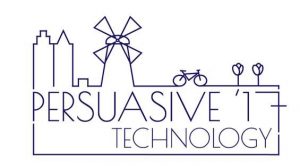
2017 Persuasive Technology conference theme:
Smart Monitoring and Persuasive Coaching
Persuasive technology and behavior change support systems provide means of improving healthcare via co-creation with the end-users (caregivers, caretakers, family carers) and involved stakeholders (decision makers, policymakers and industrial organizations). Persuasiveness in healthcare can be achieved through the design of empathic technologies, adaptive to personalities and tailored to individual needs and skills, through mobile devices and ambient technologies. Persuasive strategies can be applied in empathic and person-adaptive designs for health to create trust, user-engagement and adherence. This year the conference builds bridges between persuasion and personalized healthcare via empathic, user-adaptive engaging technology, real-time data collection and smart evaluations to fit the users and the context. If you are a researcher or practitioner who works on designing, developing, evaluating or implementing persuasive technologies for health or if you are studying Big Data, sensor technologies for monitoring, personalized feedback and coaching, mHealth, data visualizations, serious gaming or social media, this is the perfect time to participate in the conference.

Keynotes
Dirk Helbing is Professor of Computational Social Science at the Department of Humanities, Social and Political Sciences and affiliate of the Computer Science Department at ETH Zurich. He earned a PhD in physics at the University of Stuttgart and was Managing Director of the Institute of Transport & Economics at Dresden University of Technology in Germany. He is internationally known for his work on pedestrian crowds, vehicle traffic, and agent-based models of social systems. Furthermore, he coordinates the FuturICT Initiative (http://www.futurict.eu), which focuses on the understanding of techno-socio-economic systems, using smart data. His work is documented in hundreds of scientific articles, keynote lectures and media reports worldwide. Helbing is an elected member of the prestigious German Academy of Sciences “Leopoldina” and worked for the World Economic Forum’s Global Agenda Council on Complex Systems. He is also co-founder of the Physics of Socio-Economic Systems Division of the German Physical Society and of ETH Zurich’s Risk Center. In 2013, he became a board member of the Global Brain Institute in Brussels. Within the ERC Advanced Investigator Grant “Momentum” he works on social simulations based on cognitive agents. His recent publication in Nature discusses globally networked risks and how to respond. In a further publication in Science, he furthermore contributed to the discovery of the hidden laws of global epidemic spread. On January 10, 2014, he received a honorary PhD from Delft University of Technology, where he is now heading the PhD program “Engineering Social Technologies for a Responsible Digital Future”.
Andrea Gaggioli holds an M.S. degree in Psychology from University of Bologna and a Ph.D. in Psychobiology from the Faculty of Medicine of the University of Milan. He is currently Associate Professor at the Psychology Department of Università Cattolica del Sacro Cuore, in Milan, and consultant at the Applied Technology for Neuro-Psychology Lab (ATN-P LAB) of Istituto Auxologico Italiano, a biomedical research institute based in Milan. Prior to working with these organizations, he collaborated with the Competence Center for Virtual Reality at the Fraunhofer Institute for Industrial Engineering, Stuttgart, Germany. His main research focus is on Positive Technology, a field at the intersection of interaction design, neuroscience, and positive psychology, which studies how emerging technologies can be used to augment cognition and support mental wellbeing.

Workshop 1: Fifth International Workshop on Behavior Change Support Systems (BCSS 2017)
This workshop aims at connecting multidisciplinary researchers, practitioners and experts from a variety of scientific domains, such as information sciences, psychology, human-computer interaction, industrial design and medicine. This interactive workshop will act as a forum where experts from multiple disciplines can present their work, and can discuss and debate the pillars for persuasive technology. Topics for submissions include the design & development and evaluation of behaviour change support systems. For more information see: https://bcssworkshop.wordpress.com/
Programme Chairs: Piiastiina Tikka, University of Oulu, Finland & Randy Klaassen, University of Twente, the Netherlands
Organizing Chairs: Pasi Karppinen, University of Oulu, Finland; Roelof de Vries, University of Twente, the Netherlands; Robby van Delden, University of Twente, the Netherlands
General Co-Chairs: Harri Oinas-Kukkonen, University of Oulu, Finland; Lisette van Gemert-Pijnen, University of Twente, the Netherlands; Dirk Heylen, University of Twente, the Netherlands
Workshop 2: Contemplating change
The central aim of this workshop is to bring together experts from academia and industry to reflect on and to discuss persuasive technology in the early stages of health behavior change (i.e., pre contemplation and contemplation stages). Tackling the challenges that current state of the art in health behavior change products and systems (BCPS) face requires multidisciplinary expertise from fields such as psychology, computer science, interaction design, design methodology, philosophy and beyond. Furthermore, we aim to initiate a body of knowledge that is both theoretical in nature (e.g., methodological underpinnings of designing for behavior change) and transferrable to practice (e.g., application in case studies across various health domains).
This workshop aims to integrate research papers with design cases to acknowledge both the theoretical and practical sides of this domain. We therefore welcome submissions in two categories: (1) research papers that can focus on theory, models, or frameworks around designing for health behavior change, with a particular focus on the pre-contemplation and contemplation stages. (2) design cases to be communicated through pictorials (i.e., annotated images that explain the story of how and why a product or service was developed). For more information see http://gekeludden.com/workshop-contemplating-change. Submissions and questions can be directed to workshopcontemplatingchange@gmail.com.
Workshop organizers:
Deger Ozkaramanli, University of Liverpool
Dr. Geke Ludden, University of Twente
Dr. Armagan Karahanoglu, University of Twente
Workshop 3: Personalizing Persuasive Technologies: Progress, Challenges, and Opportunities
Personalizing persuasive technologies can increase their efficacy at motivating the desired behavior change. Building on the success of the 2016 workshop which witnessed 16 paper presentations, 2 keynote presentations, and 43 participants from over 10 different countries, this year’s workshop aims to advance the research area even further by addressing outstanding challenges and opportunities identified during the previous workshop. The workshop aims to connect a diverse group of researchers and practitioners interested in personalizing and tailoring persuasive technologies to share their experiences, ideas, discuss key challenges facing the area, and how to move the field forward. The workshop will cover broad areas of personalization and tailoring, including but not limited to personalization models, design and evaluation methods, and personalized persuasive technologies. We welcome submissions and ideas from any domain of persuasive technology and HCI including, but not limited to health, sustainability, games, safety and security, marketing, eCommerce, entertainment, and education. Workshop papers and ideas will be archived online to be accessible to the general public. For more information see: https://personalizedpersuasion.wordpress.com/
Workshop organizers:
Rita Orji, University of Waterloo, Canada
Marc Busch, Austrian Institute of Technology, Austria
Maurits Kaptein, University of Tilburg, Netherlands
Arie Dijkstra, University of Groningen, Netherlands
Michaela Reisinger, Austrian Institute of Technology, Austria
Mattheiss Elke, Austrian Institute of Technology, Austria
Workshop 4: The Ethics of Persuasive Technologies
Persuasion and ethics have an uneasy and complicated relationship. On the one hand, persuasiveness, or rational influence or eloquence can be understood as a virtue, which enables a virtuous person to support others to also aspire to virtue. On the other hand, persuasion is met with suspicion. It seems to undermine user autonomy.
The workshop will consist in a mix of short presentations, panels, and plenary discussions. It aims to (a) bring together experts on the Philosophy of Technology and Ethics of Technology to discuss fundamental and application-oriented questions concerning the design and use of Persuasive Technologies, and (b) To facilitate the dialogue between designer and users of Persuasive Technologies and Philosophers.
Workshop organizers:
Michael Nagenborg (University of Twente)
Lily Frank (Technical University of Eindhoven)
Margoth González Woge (University of Twente)
Ching Hung (University of Twente)
Saskia Nagel (University of Twente)
Steven Dorrestijn (Saxion University)
Andreas Spahn (Technical University of Eindhoven)
Peter-Paul Verbeek (University of Twente)

Tutorial 1: Persuasive systems design, evaluation and research with the PSD model
This tutorial will introduce a conceptual framework for designing and evaluating persuasive systems, known as the Persuasive Systems Design (PSD) model [2]. The PSD describes the process of designing and evaluating persuasive systems and describes what kind of software functionality may be found in the final product. It also highlights underlying assumptions behind any persuasive system and ways to analyze contexts for persuasion. The PSD model helps select and design the persuasive features, and categorizes them into primary task, computer-human dialogue, system credibility, and social influence. This tutorial will also present research results from a wide variety of PSD related projects.
Tutorial organizer:
Prof. Harri Oinas-Kukkonen, University of Oulu
Tutorial 2: Choice Support as a Component of Persuasive Technology
This half-day tutorial offers researchers, practitioners, and students in the persuasive technology field a deep understanding of a theme introduced in the presenter’s keynote talk at Persuasive Technology 2013: People in the persuasive technology field should be able to use technology not only to persuade people to do particular things but also to help people choose for themselves. The tutorial will clarify this distinction, motivate the central claim, and introduce the participants systematically to the scientific knowledge and thought patterns that they need in order to be able to combine persuasion with choice support.
During the tutorial, general concepts and principles will be introduced with reference to concrete examples. Participants will be encouraged to contribute actively on the basis of their experience with the problems that they face in their own work.
After the tutorial, participants will be able to deepen their knowledge to any extent that they like by consulting the book-length monograph Choice Architecture for Human-Computer Interaction and optionally by pursuing the references cited in that work.
Detailed information about the tutorial will be found in a separate page.
Tutorial organizer:
Anthony Jameson, German Research Center for Artificial Intelligence (DFKI)
Call for Papers
The program committee encourages participants to submit papers, posters, demos, and workshops. For more information on the submission regulations, see Call for Papers: http://www.persuasivetechnology.eu/authors
Deadline submission:
Specified per section under Call for Papers: http://www.persuasivetechnology.eu/authors
Conference language
English.
Please note:
All presenters are required to register and pay for their participation at the congress.